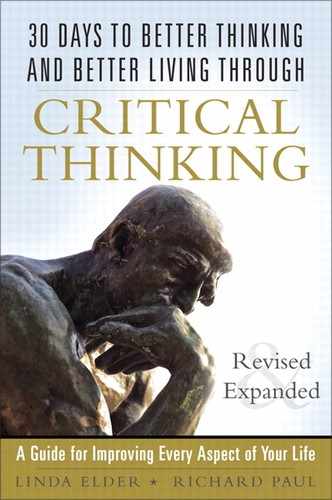Day Four. Deliberately Target Your Purposes
Thinking is always guided by human purposes. Everything you do is related to some purpose you have. Your purpose is whatever you try to accomplish. It is your goal or objective in any given situation or context.
Your thinking goes wrong when you aren’t clear about your purpose, have unrealistic purposes, have contradictory purposes, or don’t stick to your expressed purpose. Some goals are short-range and transitory; others are long-range and permanent. Some are primary. Some are secondary. Some represent your central mission in life. Others become means to other ends.
In human life, there is often a discrepancy between public (announced) goals and private (unspoken) goals. Thus, a politician’s announced goal is usually to serve public need. The real goal is often to get elected, to serve ambition, and to satisfy greed.
It is important to examine the purposes that guide how you live. Which of them are you explicitly aware of? Which of them lies beneath the surface of your thinking? Which of them would you be unwilling to admit to? How many of them guide you to superficial actions? How many of them guide you to important ends? Which of them are you having difficulty accomplishing, and why?
It is also important to be able to assess others’ purposes. Remembering that people’s real purposes often contradict their stated purposes will enable you to see through façades and keep you from being manipulated by others.
Be on the lookout for...
...today for goals, purposes, objectives, agendas. Figure out what you are after and how you are seeking it. Determine whether your various goals are interwoven and convergent or in conflict and mutually inconsistent. Determine whether your real purposes are different from your expressed purposes. Ask yourself whether you can admit your real purposes (in this or that part of your life). Figure out what your family members, associates, and friends are after. What are their real and most basic goals? To what extent are their lives undermined by contradictory drives and aims? To what extent can they admit their real purposes? Examine personal goals, professional goals, political goals, economic goals, and social goals. Make a list of your important goals and determine whether you find inconsistencies in them.
“There is no road to success but through a clear, strong purpose. Nothing can take its place. A purpose underlies character, culture, position, attainment of every sort.”
—T.T. Munger
Questions you can ask to target purpose
• What exactly is my purpose in this situation?
• What am I trying to accomplish?
• Is this purpose realistic?
• Is this goal ethically justified?
• What is my most important task right now?
• What is the first thing I need to do to accomplish my purpose?
• What is the agenda of my spouse, my children, and my friends?
• How does my agenda differ from my spouse’s, employees’, or supervisor’s?
• Does my stated agenda differ from my actual one?
• Would I be willing to admit to my true purpose in this situation? If not, why not?
Strategies for targeting purposes
• When in a meeting, note the stated purpose and determine whether people adhere to that purpose. Notice when people wander away from the purpose and be ready with questions such as: What is our main purpose again? How is this discussion helping us achieve that purpose?
• Notice when stated purposes seem to contradict actual purposes. Intervene by saying things such as: “I believe our purpose is X. But our actions seem to imply another, contradictory purpose. How can we deal with these contradictions?”
• Think deeply about the main purposes guiding your behavior every day. Identify patterns in your behavior and then figure out the purposes (your purposes) that give rise to them in this way: “One of the main things I do is X. Therefore, my purpose, which explains X, must be Y.” For instance, you might say you “want” to exercise regularly and that this is one of your goals. But then you seldom do exercise. At the same time, you rationalize your behavior—lack of exercise—by offering excuses for why you can’t exercise. This implies that your real purpose is not to exercise regularly. (Your real purpose might be to convince yourself that you are doing enough to keep in shape.) Again, we should look to your behavior to determine your real purposes.
